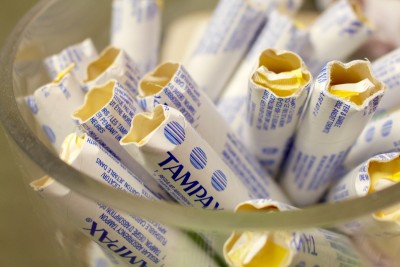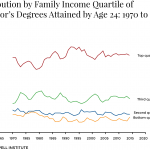
The recent national conversation around the high cost of feminine hygiene products have led students at higher education institutions to speak out in favor of having free products on campus to increase accessibility and erase the stigma around menstruation.
Students at The University of Arizona, the University of California, Los Angeles, Emory University and Columbia University have publicly demanded free tampons and menstrual pads in campus facilities earlier this month.
Though female students make up more than half of the undergraduate population, the Boston University Center for Gender, Sexuality and Activism is the one place that offers free feminine hygiene products for students on BU’s Charles River Campus.
The idea of free feminine hygiene products is popular at BU, said Claire Brown, a Student Health Ambassador with Wellness and Prevention Services. Even so, the movement as a whole requires national support. Successfully installing free feminine hygiene products on campuses and in public places is a gradual possibility, Brown argued.
“The best philosophy I’ve learned to follow is to be realistic but hopeful,” said Brown, a senior in the College of Arts and Sciences. “This issue is gaining traction nationwide, and hopefully that will translate into more momentum for change on college campuses.”
Feminine hygiene products are a necessity and an objective health care need for students, Brown said. Not only does the unavailability of feminine hygiene products maintain the reputation menstruation currently has, but it can also cause unfortunate consequences for a woman’s safety and security.
“A big part of this issue also has to do with the stigmatization surrounding menstruation,” she said. “It is a completely normal bodily function, and yet women are consistently made to feel ashamed for it. We have free toilet paper, free water bottle fill-up stations … why not free tampons? They’re a necessity for more than half of BU’s student population.”
The perception of female hygiene products as unnecessary is another negative force in the move toward prioritizing female wellness resources, Brown said.
“There are people out there who think that free tampons are just something that women and all those who menstruate, regardless of gender identity, want as a convenience,” she said, “but it’s really part of a much larger movement to achieve gender equality in health care.”
Zoey Freedman, a senior at UCLA, wrote an essay on March 2 for the Daily Bruin, arguing that the UCLA administration should provide funding for free feminine hygiene products on campus.
“The demand for these products on campus needs to come from students,” Freedman wrote in an email. “Students can work together through their student governments or bigger student groups … to have their voice heard. Ideally, the administration will see that this is necessary and will work with the students to act on it.”
Freedman noted that the importance of free and accessible pads and tampons goes beyond the practical comfort and health of women during menstruation.
“This taps into the larger issue of female and male equality, which seems to be thought to no longer be an issue, but it is,” Freedman said. “The fact that only women, whether cis or trans, are paying for these products that they have to have to live comfortably is the embodiment of inequality.”
Ben Makansi, a senior at Columbia and president of the Columbia College Student Council, said the tampon tax discussion inspired him to explore possibilities for free feminine hygiene on campus.
Working with various administrators and wellness resources on campus, Makansi and his partner instituted a pilot program that made tampons and pads available for free in the health services office, Makansi told The Daily Free Press.
“We agreed on a pilot program to gauge usage and feedback and go from there,” he said. “The program started yesterday, the first day back from spring break. Over the next month, we will be looking at usage and gathering feedback from students, and that will inform future efforts.”
Several BU students said the movement for more accessible feminine hygiene products is necessary for a move toward overall equality for women.
Arianna Davis, a sophomore in CAS, said BU students should react and make this necessity available for women on campus.
“This is something that affects every girl,” she said. “We pay enough for BU, so the least they could do is offer cheaper, more accessible feminine products. If enough students cause a ruckus and stand together, whether that be through protests, petitions or social media action, I believe change could be made.”
Nivedita Natarajan, a freshman in the College of Engineering, said all students should be concerned with female students’ access to feminine hygiene products.
“This issue is important regardless of gender,” she said. “It’s the same as keeping free knives and forks where you eat or free toilet paper where you go to the bathroom. It’s necessity.”
Gloria Ihenetu, a freshman in the College of General Studies, said open conversations about issues of women’s health are critical to moving past gender inequality.
“There is a need to get rid of the stigma pertaining to women’s reproductive health,” she said. “There’s a direct correlation between thinking periods are gross or discounting the importance of talking about them … My point is, the only way to strip feminine hygiene of its taboo label is to talk about it.”
Brianne Garrett contributed to the reporting of this article.




